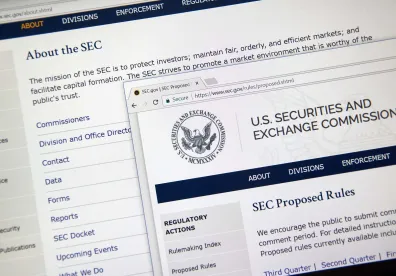During an open meeting on Wednesday, August 23, 2023, the U.S. Securities and Exchange Commission (the “SEC” or the “Commission”) voted 3-2 along party lines to adopt new rules1 (collectively referred to as the “Private Funds Rules” or the “Rules”) proposed under the Investment Advisers Act of 1940 (the “Advisers Act”). The Commission’s stated purpose of the Rules is to enhance the regulation of private fund advisers by facilitating transparency, promoting more efficient capital markets, and encouraging capital formation.
When presenting the proposed Rules for public comment back in February of 2022, the SEC emphasized the need for stricter regulation of the private funds market and insisted that a sweeping overhaul to the existing rules was vital to the protection of investors against potentially opaque and conflict-prone practices by private fund advisers. However, the adopted Rules, while still the most significant revamp of U.S. private funds regulation since the implementation of Dodd Frank in 2010, are a far less reaching iteration of the SEC’s original proposal, with significantly less bite than anticipated throughout the industry.
Below, we summarize the Rules as adopted and note the key areas of modification from the SEC’s original proposal. We then review the timelines to compliance and the scope of grandfathering (or “legacy”) status granted by the Commission to private funds in existence before the compliance dates of the Rules.
New Rules for Private Fund Advisers Registered with the SEC2
The Commission imposed three new Rules applicable only to SEC-registered advisers:3 the “Quarterly Statement Rule”, the “Private Fund Audit Rule” and the “Adviser-led Secondaries Rule”. The Commission also adopted the proposed amendments to the Advisers Act Compliance Rule.
Quarterly Statement Rule
The Quarterly Statement Rule aims to increase transparency in private fund fees and expenses, performance, and conflicts of interest. The Rule requires SEC-registered private fund advisers to provide investors with quarterly statements disclosing an enumerated list of fund-level information regarding standardized performance reporting, fees and expenses paid by and allocated to the private fund, and certain compensation paid to the adviser and its related persons (including any related fee offsets). Advisers must prepare such quarterly statements for any private fund that it advises unless a quarterly statement that complies with the rule is prepared and distributed by another person. The quarterly statement must include performance results calculated both with and without the use of capital call lines, as well as prominent disclosures regarding how all expenses and fee offsets are calculated and include cross-references to the relevant private fund’s governing documents.
The final Rule adopts modified distribution timelines as compared to the original rule, which required the distribution of quarterly statements within 45 days of the end of each calendar quarter. In contrast, the final Rule permits the following:
- If the private fund is a fund of funds: a quarterly statement must be distributed to investors within 75 days after the first three quarters of the fund’s fiscal year and 120 days after the end of the fund’s fiscal year.
- If the private fund is not a fund of funds: a quarterly statement must be distributed to investors within 45 days after the end of each of the first three quarters of the fiscal year and 90 days after the end of the fund’s fiscal year.
In connection with its adoption of the Quarterly Statement Rule, the SEC also voted to amend the preexisting books and records rule (Rule 204-2) under the Advisers Act to require advisers to retain books and records relating to the preparation and distribution of quarterly statements under the new Quarterly Statement Rule.
Private Fund Audit Rule
The Private Fund Audit Rule requires SEC-registered private fund advisers to obtain an independent annual financial statement audit of each of the private funds they advise (whether directly or indirectly) that meets the requirements of the audit provision in the Advisers Act custody rule (Rule 206(4)-2).
Also consistent with the custody rule, a private fund’s audited financial statements must be distributed to current investors within 120 days of the end of the fund’s fiscal year (or 180 days for funds of funds). The Rule is intended to protect against the misappropriation of assets and to ensure accurate valuation processes by advisers.
The Rule’s overall alignment with those requirements of the custody rule represents a notable pivot from the proposed rule, which speculated audit requirements in addition to those of the custody rule. Another deviation from the proposed rule is that the final Rule does not require auditors to notify the Commission of certain issues arising under the audits.
Adviser-led Secondaries Rule
The SEC voted to adopt a modified version of the Adviser-Led Secondaries Rule, which aims to reduce potentially fraudulent or manipulative activity by advisers and to ensure the accurate valuation of subject assets.
The Rule now requires SEC-registered advisers conducting an adviser-led secondary transaction to obtain either a fairness or a valuation opinion from an independent provider with respect to the transaction, as opposed to the fairness opinion mandated in the SEC’s original proposal. The adviser must also provide investors with a written summary of any recent material business relationships between the adviser (or its related persons) and the independent opinion provider.
The final Rule states that the fairness or valuation opinion, as well as the written summary of material business relationships, must be furnished to investors prior to the due date of the election form for the transaction, instead of prior to the closing of the transaction as originally proposed. Also of note is that tender offers are excluded from the definition of “adviser-led secondary transaction[s]” to which the final Rule applies.
Adoption of the Proposed Amendments to the Advisers Act Compliance Rule
The Commission also voted to adopt the proposed amendments to the Advisers Act compliance rule, thereby requiring all SEC-registered advisers to document in writing the annual review of their compliance policies and procedures, as well as the effectiveness of such policies and procedures. These amendments did not change against those originally proposed in February 2022.
New Rules for All Private Fund Advisers4
In addition to the above Rules targeting SEC-registered advisers, the Commission adopted two new rules applicable to all investment advisers, regardless of registration status:[5] the “Restricted Activities Rule” and the “Preferential Treatment Rule”.
Restricted Activities Rule
The Restricted Activities Rule (referred to as the “Prohibited Activities Rule” in the SEC’s original proposal) was perhaps the most controversial and anxiously awaited aspect of the Rules. After significant pushback from commenters (discussed in greater detail below), the SEC adopted a modified version of the proposed rule restricting all private fund advisers, regardless of registration status, from engaging in certain sales practices, conflicts of interest, and compensation schemes unless disclosure is made and, in certain cases, investor consent is obtained. Notably, the final Rule indicates that the requirement to obtain investor consent will not be satisfied merely by obtaining the consent of a private fund’s limited partner advisory committee. Rather, for purposes of the Rule, investor “consent” generally refers to a majority in interest of private fund investors excluding investor interests held by related persons of the private fund adviser.
The Restricted Activities Rule addresses five specific activities of private fund advisers that were to be prohibited under the SEC’s original proposal without exception:
Restricted Activities with Disclosure-Based Exceptions
- Regulatory, compliance, and examination expenses.Private fund advisers are now prohibited from charging their private fund clients for (i) regulatory or compliance fees and expenses of the adviser or its related persons, and (ii) fees and expenses associated with an examination of the adviser or its related persons by any governmental or regulatory entity unless the adviser distributes written notice within 45 days of each quarter-end after such fees or expenses were incurred by the private fund client.
- Reducing adviser clawbacks for taxes.To reduce the amount of any adviser clawback by actual, potential, or hypothetical taxes applicable to the adviser, its related persons, or respective owners or interest-holders, private fund advisers must distribute a written notice to the investors of the impacted private fund client that provides the aggregate dollar amounts of the clawbacks both before and after any such reduction for taxes, within 45 days after the end of the fiscal quarter in which the clawback occurs.
- Certain non-pro rata fee and expense allocations.In instances where multiple private fund clients of a private fund adviser are participating in the same portfolio investment, the adviser may no longer allocate or charge portfolio-level fees and expenses among such funds and clients on a non-pro rata basis unless (i) the non-pro rata charge or allocation is fair and equitable under the circumstances and (ii) prior to charging or allocating such fees or expenses to a private fund client, the investment adviser distributes to each investor a written notice of the non-pro rata charge or allocation and a description of how it is fair and equitable under the circumstances.
Restricted Activities with Certain Investor Consent Exceptions
- Investigation expenses. Private fund advisers are now prohibited from charging their private fund clients for fees and expenses associated with investigations by any governmental or regulatory authority unless the adviser seeks consent from all investors of the relevant private fund and obtains written consent from at least a majority in the interest of investors. However, even if an adviser obtains the requisite consent, it is still prohibited from charging its private funds for fees or expenses related to an investigation that results or has resulted in a court or governmental authority imposing a sanction for a violation of the Advisers Act.
- Borrowing. The final Restricted Activities Rule prohibits private fund advisers from borrowing funds, securities, or other assets from a private fund client unless the adviser (i) distributes to investors a written notice and description of the material terms of the borrowing to the investors of the private fund and (ii) obtains written consent from at least a majority in interest of the fund’s investors that are not related persons of the adviser. The final Rule does not dictate specific terms of the borrowings; rather, it only requires advisers to disclose the material terms of such borrowings. Notably, this restriction will not apply to adviser borrowings from a third party on the private fund’s behalf or to the adviser’s borrowings from individual investors outside of the fund (e.g., an adviser may receive a loan from a bank that has also separately invested in the adviser’s private fund).
The original “Prohibited Activities Rule” proposed by the SEC was undoubtedly more rigid than the Restricted Activities Rule ultimately adopted. Specifically, the proposal prohibited these and other activities outright, with no disclosure or consent exceptions. During the comment period, many commentators voiced strong disapproval of the approach, arguing in part that the proposals interfered with many of the widely accepted and negotiated positions between advisers and their private fund clients (and, indirectly, investors in their private fund clients) and called for significant modification of the rule prior to adoption. After consideration of the alternatives, the SEC determined that the disclosure and consent requirements would sufficiently protect investors while still allowing them to potentially benefit from these activities when carried out in the best interests of the private fund client.
It is important to note that the initial proposed rule would have also prohibited private fund advisers from seeking reimbursement, indemnification, exculpation from or limitation of its liability to the private fund or its investors for a breach of fiduciary duty, willful misfeasance, bad faith, recklessness or negligence in providing services to private fund clients. Upon review of the comments received (most of which were negative), the SEC ultimately decided not to adopt such prohibitions. Arguments by commentators against the adoption of such proposals emphasized, among others, increased costs for investors (e.g., on account of the greater likelihood for advisers to procure general partner liability insurance policies and resulting higher premiums, the costs of which would likely be passed on to private fund investors), increased threat of private litigation, hesitation of advisers to take investment risks that therefore could result in lower investor returns and fewer available strategies, and inappropriate interference by the Commission in the contractual arrangements reached between private funds and investors. The Commission did, however, “reaffirm and clarify” its views on how fiduciary duties and the Advisers Act’s antifraud rules apply to private fund clients and their investors, and largely echoed earlier guidance from its 2019 IA Fiduciary Duty Interpretation (which emphasized the Advisers Act as a disclosure-based regime).
It is also worth noting that, contrary to the text of the proposed rule, the SEC decided to adopt the final Rule without including an express prohibition on the collection of fees by private fund advisers for services not performed. In its final release, the Commission indicated that the inclusion of such language was unnecessary because the contemplated practice itself violates a private fund adviser’s fiduciary duty, thus rendering it de facto prohibited in any event.
Preferential Treatment Rule
As adopted, the Preferential Treatment Rule prohibits all private fund advisers, regardless of registration status, from providing certain kinds of preferential treatment to any investor in a private fund, unless the adviser satisfies certain disclosure obligations.
Specifically, private fund advisers will be prohibited from granting an investor the ability to redeem its interests on terms that the adviser reasonably expects to have a material, negative effect on other investors in the fund or in a similar pool of assets unless (i) the investor is bound by applicable laws, rules, or regulations that mandate such a redemption right, or (ii) the adviser has offered the same redemption ability to all existing investors and will continue to offer the same redemption ability to all future investors in the fund or similar asset pool. Such exceptions were not present in the SEC’s original proposal.
Additionally, the Preferential Treatment Rule restricts private fund advisers from disclosing information regarding portfolio holdings or exposures of a private fund client or of a similar pool of assets to any investor where the adviser reasonably expects that providing the information would have a material, negative effect on other investors in that private fund or in a similar pool of assets unless the adviser offers such information to all other existing investors (at substantially the same time). This practice was prohibited without exception in the original proposal.
The Preferential Treatment Rule also prohibits advisers from granting any other preferential treatment to any investor in the private fund unless the adviser delivers certain written disclosures to prospective and current investors that “describe specifically” all preferential treatment provided by the adviser or its related persons to other investors in the same fund. In the case of prospective investors, however, such notice is only required to specify any preferential treatment related to any material economic terms (including but not limited to, the cost of investing, liquidity rights, fee breaks, and co-investment rights) that the adviser or its related persons provide to other investors in the same private fund.
In the case of current investors, such written disclosures must be provided on an annual basis and include all new preferential treatment terms provided since the last annual notice. However, in a change from the original SEC proposal, the Final Rule permits the adviser to distribute such written notice to current investors as soon as reasonably practicable following the end of the fund’s fundraising period (in the case of an illiquid fund) or following the investor’s investment in the private fund (in the case of a liquid fund).
Transition Period, Compliance Date, and Legacy Status
Transition Periods and Compliance Date
In a change from the proposed transition period of one year following the Rules’ publication in the Federal Register, the SEC has adopted an 18-month transition period for the Quarterly Statement Rule and Private Fund Audit Rule, and staggered compliance dates for the Adviser-led Secondaries Rule, the Restrictive Activities Rule and the Preferential Treatment Rule as follows:
- For advisers with $1.5 billion or more in private funds assets under management: a one-year transition period.
- For advisers with less than $1.5 billion in private fund assets: an 18-month transition period.
Compliance with the amended Advisers Act compliance rule (Rule 206(4)-7) will be required 60 days after publication in the Federal Register.
Limited Grandfather Status for Private Fund Clients Existing as of Adviser’s Compliance Date
Importantly, the final Rules grant limited “legacy” or grandfathering status to existing private fund clients for the redemption and information aspects of the Preferential Treatment Rule and the aspects of the Restricted Activities Rule requiring investor consent. With that said, the disclosure aspects of the Preferential Treatment Rule and the Restrictive Activities Rule will still apply to existing private funds and all other requirements of the final Rules applicable to a private fund adviser will begin to apply after the compliance date with respect to all of the adviser’s private funds. The legacy status provision of the Rules applies to governing agreements (e.g., subscription agreements, side letters, and limited partnership agreements) entered into prior to the adviser’s compliance date.
Final Thoughts
While the Rules adopted by the SEC are significantly diluted against the original proposals rolled out last February, the final Private Funds Rules contain a number of requirements that both private fund advisers and investors will become familiar with. Advisers should begin to consider the requisite updates needed to their private fund reporting, governing documents, policies, and procedures, and investors should expect to see such updates roll out in due course. Investors should become familiar with the new reporting information, disclosure, and consent requirements with respect to certain matters.
1 The SEC’s full report on the Rules can be found at https://www.sec.gov/files/rules/final/2023/ia-6383.pdf. The SEC’s summary fact sheet on the Rules can be found at https://www.sec.gov/files/ia-6383-fact-sheet.pdf.
2 Notably, the SEC made clear that, consistent with its historical position, these three new Rules are substantive rules under the Advisers Act that will not apply with respect to the non-U.S. private fund clients of an SEC-registered offshore adviser regardless of whether they have U.S. investors. In addition, none of the Rules (other than the proposed amendments to the Advisers Act compliance rule) will apply to advisers, whether registered with the SEC or exempt from registration, to the extent they manage “securitized assets” (which is defined similarly to the definition of such term in the Form PF and Form ADV).
3 While not discussed in the text of the Rules themselves, the SEC has indicated that it might someday consider extending the Quarterly Statement Rule and the Private Fund Audit Rule to Exempt Reporting Advisers (“ERAs”). However, the SEC made clear that it would need considerably more input prior to proposing application to ERAs and is thus not a concern at this time.
4 Similar to the above, the SEC made clear that, consistent with its historical position, the Restricted Activities Rule and Preferential Treatment Rule are substantive rules under the Advisers Act that will not apply with respect to the offshore fund clients of an SEC-registered offshore adviser, nor will they apply to offshore unregistered advisers with respect to their offshore funds, regardless of whether such funds have U.S. investors.
5 ERAs, State-regulated advisers, advisers relying on the foreign private adviser exemption, and advisers that are otherwise unregistered are also required to comply with the Restricted Activities Rule and the Preferential Treatment Rule.









 />i
/>i

